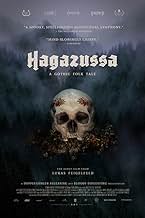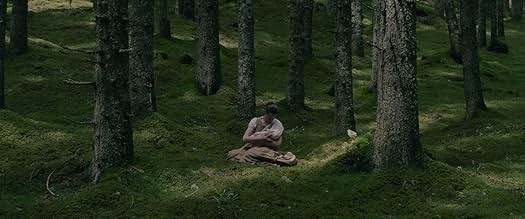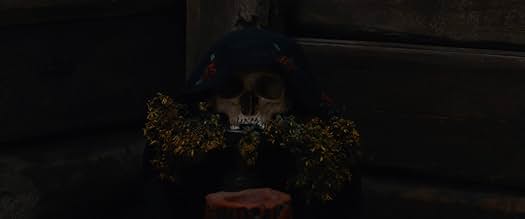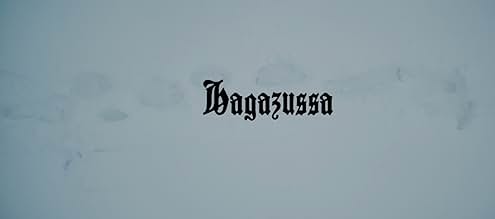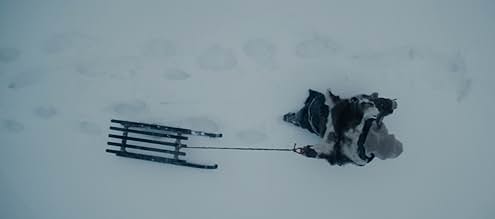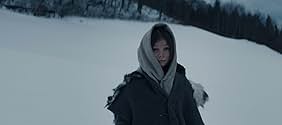After the loss of her tormented mother, the erratic behavior of a 15th century woman living in an isolated mountain village becomes a threat to the safety of her infant child.After the loss of her tormented mother, the erratic behavior of a 15th century woman living in an isolated mountain village becomes a threat to the safety of her infant child.After the loss of her tormented mother, the erratic behavior of a 15th century woman living in an isolated mountain village becomes a threat to the safety of her infant child.
- Awards
- 5 wins & 9 nominations total
Tanja Petrovsky
- Swinda
- (as Tanja Petrovskij)
Killian Abeltshauser
- Farmer
- (as Kilian Abeltshauser)
- Director
- Writer
- All cast & crew
- Production, box office & more at IMDbPro
Featured reviews
Hagazussa is a film rightly compared to its contemporary in "The Witch" and it undoubtedly suffers for it.
Where The Witch laid out a basic narrative structure and sowed the seeds of malevolence in far more obvious terms, it did not lose its impact or atmosphere during the slower burning scenes. In fact, they served to highlight the ever growing sense of dread - allowing the mind to wander into dark possibilities without ever losing sense of itself.
Hagazussa approaches a similar theme - superstitions, isolation and how misconceptions about the natural world played into daily life during the 16th century, but delivers far less in terms of narrative.
This is more a trip through the life of an outcast Mother & Daughter and we the audience are left to piece together the elements one by one as events unfold.
For me the main question posed by the movie was whether Albrun was indeed going mad or whether she was a witch.
While there is a glaring lack of dialogue that would help to flesh out some of the themes pushed forward (the interactions with Nature, impacts of disease etc) there are enough clues in the imagery to understand that Albrun is undergoing a transformation of some kind, whether it be the loss of her own sanity or something more supernatural.
The presence of the plague and its impact on both Albrun and the local villagers are a catalyst for the films major plot points, as is the intense isolation and persecution of Albrun and its influence over her mental state.
Due to the space in between each element coming together, it is difficult to maintain focus as a viewer and I found myself distracted by my own mind wandering...asking myself if there was something I was missing.
There is a movie worth watching somewhere in here, but it is buried so deep under a pile of long takes and ambiguity, that many will simply look for answers in a different film altogether.
Where The Witch laid out a basic narrative structure and sowed the seeds of malevolence in far more obvious terms, it did not lose its impact or atmosphere during the slower burning scenes. In fact, they served to highlight the ever growing sense of dread - allowing the mind to wander into dark possibilities without ever losing sense of itself.
Hagazussa approaches a similar theme - superstitions, isolation and how misconceptions about the natural world played into daily life during the 16th century, but delivers far less in terms of narrative.
This is more a trip through the life of an outcast Mother & Daughter and we the audience are left to piece together the elements one by one as events unfold.
For me the main question posed by the movie was whether Albrun was indeed going mad or whether she was a witch.
While there is a glaring lack of dialogue that would help to flesh out some of the themes pushed forward (the interactions with Nature, impacts of disease etc) there are enough clues in the imagery to understand that Albrun is undergoing a transformation of some kind, whether it be the loss of her own sanity or something more supernatural.
The presence of the plague and its impact on both Albrun and the local villagers are a catalyst for the films major plot points, as is the intense isolation and persecution of Albrun and its influence over her mental state.
Due to the space in between each element coming together, it is difficult to maintain focus as a viewer and I found myself distracted by my own mind wandering...asking myself if there was something I was missing.
There is a movie worth watching somewhere in here, but it is buried so deep under a pile of long takes and ambiguity, that many will simply look for answers in a different film altogether.
Folk horror subgenre is close to my heart, and so I finally had to check this German/Austrian nightmare. It's certainly a divisive one. The ever-raging battle of relationship between style and substance among film fans continues here, too, and I seem to land in the middle. I believe director Lukas Feigelfeld, to whom this is film school graduation project, intended a trip. Very gloomy, meditative, earthly trip.
The film contains only a few lines of dialogue. The plot is barely even there, as the movie, in every minute of it, thrives on atmosphere and feelings. The main character doesn't reason much, or scheme, or rationalize, the "plot", or rather mood is driven by mere feelings of hers. Heavy feelings, building an atmosphere that almost tires you. The pacing is much slower than your typical described slow-burner, and the movie demands some sinking into for it to execute its intentions. It's almost like a film equivalent of a gothic painting, a mural that you have to consume with long attention to all detail. The cinematography is beautiful, locations isolated, mossy, almost ancient-like.
A patient man's film, and indeed one for those who appreciate strong on emphasis style, and unspoken moods. On a side note, I had noticed plenty of people put "Hagazussa" against "The VVitch" with the latter coming in second, and with that I, in good conscience, have to disagree. 6/10.
The film contains only a few lines of dialogue. The plot is barely even there, as the movie, in every minute of it, thrives on atmosphere and feelings. The main character doesn't reason much, or scheme, or rationalize, the "plot", or rather mood is driven by mere feelings of hers. Heavy feelings, building an atmosphere that almost tires you. The pacing is much slower than your typical described slow-burner, and the movie demands some sinking into for it to execute its intentions. It's almost like a film equivalent of a gothic painting, a mural that you have to consume with long attention to all detail. The cinematography is beautiful, locations isolated, mossy, almost ancient-like.
A patient man's film, and indeed one for those who appreciate strong on emphasis style, and unspoken moods. On a side note, I had noticed plenty of people put "Hagazussa" against "The VVitch" with the latter coming in second, and with that I, in good conscience, have to disagree. 6/10.
"HAGAZUSSA" For the most part is a very dark and grim atmospheric film that's beautifully shot and well performed by the actors. It had great potential to go beyond the depth of "The Witch" but doesn't scratch the surface enough for you to feel enlightened or better informed by what you just witnessed for an hour & 45 minutes. The lack luster ending that everyone falsely raves about is pathetic and that's a gross understatement. Did the film have it's moments yes but none of them were slam dunks and every one of those scenes left points on the board because it never followed through. Whether lying in bed with her mother or watching from behind her in the lake from 50 yards away, That's not enough when you compare it to films like "MIDSOMER" or "HEREDITARY".
Definitely had potential but nothing here is a must see or disturbing enough to make it memorable 6 months from now. And that's truly disappointing to waste such a good effort.
HAGAZUSSA has everything going for it: A bleak, dreary atmosphere of increasing dread, mixed with a subtle, almost poetic style. The spacious cinematography captures the vastness of the Alps, making the main character, Albrun (Aleksandra Cwen), seem all the more isolated.
On its surface, it's a story of witches, set in the desolate, yet beautiful mountains of 15th Century Austria. It's also about abandonment, survival, betrayal, and revenge.
Many compare it to THE WITCH, but these films are two completely different takes on similar subject matter. One thing they do share however, is the way they leave it up to the viewer to decide whether the story's events are truly supernatural, psychological, or a mixture of both.
This is a quiet, disturbing movie, with very sparse dialogue. Most of the more chilling bits are saved for the final third. While it is well made and thoroughly dark, it's probably not for everyone...
On its surface, it's a story of witches, set in the desolate, yet beautiful mountains of 15th Century Austria. It's also about abandonment, survival, betrayal, and revenge.
Many compare it to THE WITCH, but these films are two completely different takes on similar subject matter. One thing they do share however, is the way they leave it up to the viewer to decide whether the story's events are truly supernatural, psychological, or a mixture of both.
This is a quiet, disturbing movie, with very sparse dialogue. Most of the more chilling bits are saved for the final third. While it is well made and thoroughly dark, it's probably not for everyone...
We live in an extremely fast paced world....overfloaded by stimuli that are all around us. Used be able to get from A to B in no time....and most movies of our time adapt this pace.
But this one is different. It is not only set in very different time, it IS this different time. This movie lets you feel the slower pacing of old times. What some critics consider painstakingly boring, is just the clash between live has been paced a long time ago and how it is now. It is menacing - and I think it is supposed to be.
There is a nearly absolut absence of dialog. There are only a few sentences spoken in the entire movie. That is another clash between days past and our time. We talk all the time, chatter about just anything. But not in this movie. There is no need to talk. Just feel it.
And this movie is a lot about FEELING it. The main character does not elaborate or think about things - she just feels...like an animal. Just be and feel.
This movie doesn´t make sense. There is no plot that has to make sense. This is just being. It is what it is.
I have to watch it again to decide if I give it an even higher rating.
But this one is different. It is not only set in very different time, it IS this different time. This movie lets you feel the slower pacing of old times. What some critics consider painstakingly boring, is just the clash between live has been paced a long time ago and how it is now. It is menacing - and I think it is supposed to be.
There is a nearly absolut absence of dialog. There are only a few sentences spoken in the entire movie. That is another clash between days past and our time. We talk all the time, chatter about just anything. But not in this movie. There is no need to talk. Just feel it.
And this movie is a lot about FEELING it. The main character does not elaborate or think about things - she just feels...like an animal. Just be and feel.
This movie doesn´t make sense. There is no plot that has to make sense. This is just being. It is what it is.
I have to watch it again to decide if I give it an even higher rating.
Did you know
- TriviaGraduation film of director Lukas Feigelfeld.
- ConnectionsFeatured in Woodlands Dark and Days Bewitched: A History of Folk Horror (2021)
- How long is Hagazussa?Powered by Alexa
Details
- Release date
- Countries of origin
- Language
- Also known as
- Hagazussa: A Heathen's Curse
- Production companies
- See more company credits at IMDbPro
Box office
- Gross US & Canada
- $13,253
- Opening weekend US & Canada
- $6,041
- Apr 21, 2019
- Gross worldwide
- $21,487
- Runtime
- 1h 42m(102 min)
- Color
- Aspect ratio
- 2.39:1
Contribute to this page
Suggest an edit or add missing content


